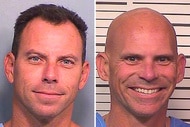Create a free profile to get unlimited access to exclusive videos, breaking news, sweepstakes, and more!
Massive Dark Web Drug And Money Laundering Operation Busted, Authorities Say
Chester Anderson, Jarette Codd and Ronald MacCarty are accused of selling and shipping hundreds of thousands of fake Xanax tablets and other controlled substances across 43 states, as well as laundering $2.3 million in cryptocurrency.

Three New Jersey men who allegedly ran a major darknet drug operation that sold hundreds of thousands of counterfeit narcotic pills were busted after several huge ATM withdrawals led investigators to their doorstep.
The Manhattan District Attorney’s Office on Tuesday announced the indictments of Chester Anderson, 44, Jarette Codd, 41, and Ronald MacCarty, 51, who were involved with a vendor known as “Sinmed.”
The digital storefront, which operated out of Asbury Park, New Jersey, on a darknet market (DNM) called Dream Market, is accused of selling and shipping hundreds of thousands of fake Xanax tablets and other controlled substances across 43 states, as well as laundering $2.3 million in cryptocurrency with preloaded debit cards and withdrawing more than $1 million from ATMs in New York and New Jersey.
Investigators made a series of undercover purchases using cryptocurrency, and proceeded to execute search warrants of the suspects’ property in New Jersey. They seized the largest amount of pills in the state’s history: between 420,000 to 620,000 Xanax tablets, 500 glassines of fentanyl-laced heroin, and quantities of ketamine, GHB, methamphetamine and more.
“Not only is this the first time state prosecutors in New York have taken down a dark web storefront, this takedown represents the largest pill seizure in New Jersey’s history,” District Attorney Cy Vance said in a statement. “If you are engaging in illicit activity on the dark web, you are on notice: we know how to find you, we know how to put you out of business, and we know how to hold you criminally accountable.”
Authorities say they also seized pill presses and other drug manufacturing equipment, as well.
The bust comes weeks after the Joint Criminal Opioid and Darknet Enforcement (J-CODE) team—made up of agents from the FBI, DEA, CBP and more—announced that it had arrested 61 individuals and closed down 50 darknet accounts as part of Operation SaboTor.
Sinmed, meanwhile, allegedly was one of the foremost sellers on Dream Market, currently the most popular DNM, an encrypted, largely anonymous area of the internet that is only accessible through tools such as the Tor browser. In fact, Sinmed was among Dream Market’s top 3 percent of vendors in terms of transactions, according to WIRED.
But Vance’s office received a tip in 2017 about unusually large ATM withdrawals happening in Manhattan and New Jersey, according to ABC News, and thus began tracking the three men supposedly involved in the operation.
“When our office received reports of suspicious activity at ATMs in New York and New Jersey, our talented investigators followed the money, using our state-of-the-art Cyber Lab to uncover a dark web counterfeit pill seller whose $2.3 million operation spanned the U.S.,” Vance said in the statement.
According to Eileen Ormsby, author of the book “The Darkest Web,” despite major players on the darknet employing a variety of constantly-evolving money laundering and cashing-out techniques, there are always risks involved.
“Converting crypto to [government-issued currency] has always been one of the main ... danger zones for large dark web vendors,” she told Oxygen.com in an email on Wednesday.
Eric Jardine, an assistant professor of political science at Virginia Tech and a former fellow at the Center for International Governance Innovation (CIGI), added that “the weak point for vendors” often arises on the offline side of things.
“It’s taking a product to the post office and not getting flagged, or changing a digital currency into a hard currency,” he told Oxygen.com on Thursday. “Those are the points where an intervening actor can flag bad behavior.”
In the case of the Sinmed bust, state and local authorities worked in conjunction with the U.S. Postal Inspection Service, as well as the Secret Service and the Department of Homeland Security.
“Dark web operators should know when you make the US Mail a party to your illicit deeds, you bring not only Postal Inspectors but the full weight of law enforcement to stop you in your tracks from victimizing the public,” Edward Gallashaw, USPIS assistant inspector in charge, said in a statement.
Anderson was slapped with a slew of charges, including money laundering, identity theft, criminal sale of a controlled substance and conspiracy, while Codd and MacCarty also face money laundering and conspiracy charges. All three have pleaded not guilty.























